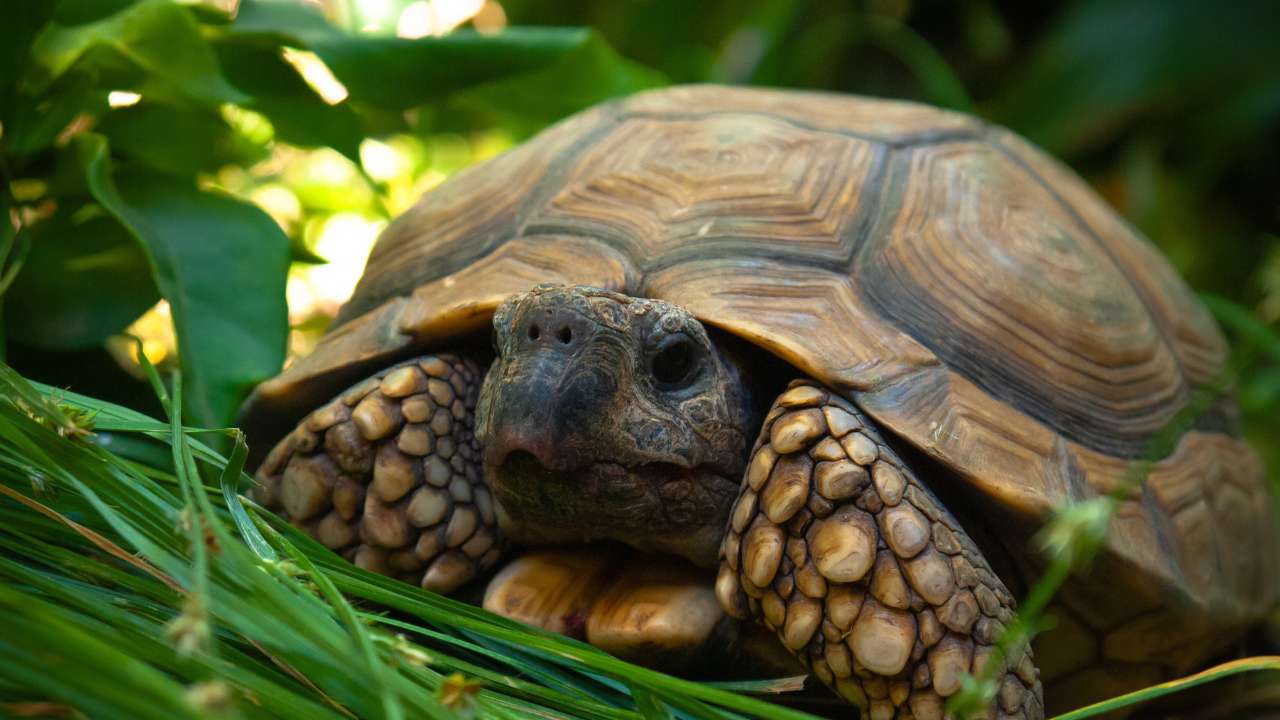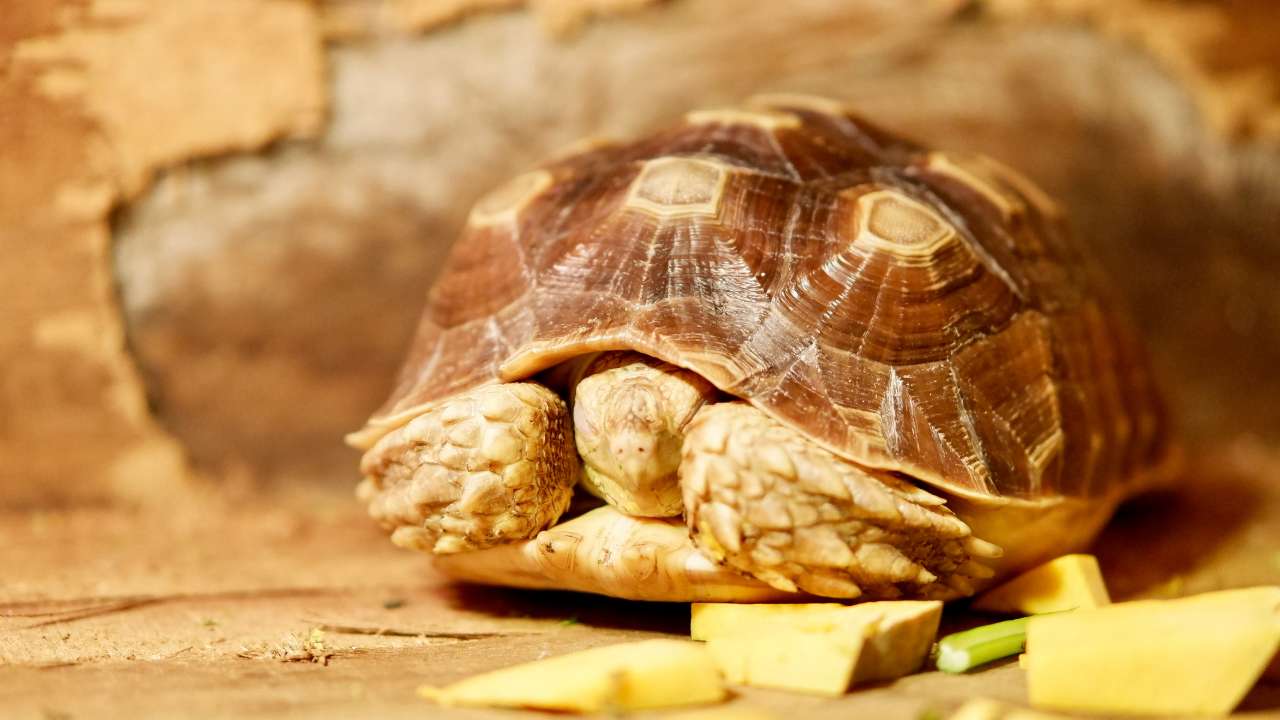Understanding Baby Sulcata Tortoise Nutrition
Sulcata tortoises are herbivores, primarily feeding on grasses, leafy greens, and other plant matter in their natural habitat. However, raising a baby Sulcata in captivity presents unique challenges. Unlike their wild counterparts, these tortoises are often raised indoors or in controlled environments, meaning their diet must be carefully managed to mimic the nutritional value found in their natural surroundings.
The primary components of a baby Sulcata tortoise’s diet should include high-fiber grasses and greens, which promote healthy digestion and prevent common problems such as obesity or shell deformities. Their digestive system is adapted to break down fibrous plant material, which provides essential nutrients and aids in their overall growth. Furthermore, their diet should be low in protein and high in calcium and fiber, which are necessary for the development of strong bones and a healthy shell.

Also Read
Essential Foods for Baby Sulcata Tortoises
Grasses and Weeds
The foundation of a baby Sulcata’s diet should consist of grasses and weeds, as these are the natural food sources in their native habitat. Grasses such as Bermuda, rye, fescue, and Timothy hay are excellent choices. These grasses provide the right balance of fiber, vitamins, and minerals needed for growth. Dandelion greens, clover, and plantain leaves are also great additions to their diet. Ensure that any grasses or weeds you feed are free from pesticides and other harmful chemicals.
Leafy Greens
Leafy greens are a vital source of nutrition for baby Sulcata tortoises. Greens like collard greens, mustard greens, turnip greens, and kale offer a high calcium-to-phosphorus ratio, which is crucial for shell development. They also provide essential vitamins like Vitamin A and K, which help support their immune system and overall health. However, it’s important to avoid feeding them spinach or beet greens regularly, as these can cause calcium absorption issues due to their high oxalate content.
Vegetables
Although baby Sulcata tortoises are primarily herbivores, vegetables can be included in their diet to provide additional nutrients. Suitable vegetables include squash (both butternut and zucchini), carrots (grated or chopped), and bell peppers (cut into small pieces). These vegetables provide additional vitamins, minerals, and moisture to help keep the tortoise hydrated, but they should be fed in moderation to avoid an imbalance in their diet.
Fruits
While fruits are not a staple of a Sulcata tortoise’s diet, they can be offered occasionally as a treat. Suitable fruits include strawberries, papaya, watermelon, and apples (without seeds). Fruits provide a healthy dose of vitamins, particularly Vitamin C, and antioxidants. However, due to their high sugar content, fruits should only be given sparingly to avoid digestive issues or obesity.
Commercial Tortoise Food
Some pet owners may choose to supplement their tortoise’s diet with commercial tortoise food. These pellets or prepared blends often contain a mixture of grasses, hay, and other natural ingredients, along with added vitamins and minerals. However, commercial foods should only be used as a supplement and not the main component of the diet. Fresh, organic vegetables and grasses should always take priority.
Foods to Avoid
Certain foods should be avoided at all costs, as they can cause health issues or even be toxic to baby Sulcata tortoises. These include:
- Iceberg Lettuce: While it’s often seen as a harmless food, iceberg lettuce offers little nutritional value and can cause diarrhea or dehydration in tortoises.
- Spinach: High in oxalates, spinach can bind calcium and make it difficult for your tortoise to absorb this essential nutrient.
- Avocado: Avocado contains persin, a toxin that can be deadly to tortoises.
- Citrus Fruits: High acidity in fruits like oranges or lemons can cause digestive upset in tortoises.
- Processed Foods: Avoid feeding tortoises processed foods, as these are often high in sugar, salt, and artificial additives that can harm their health.
It’s also important to ensure that the food you offer your tortoise is free of pesticides, herbicides, or other chemicals that could be harmful.
Supplements for Baby Sulcata Tortoises
Calcium and Vitamin D3
To promote healthy bone and shell development, baby Sulcata tortoises require a calcium supplement, especially since their diet may not always provide enough. Sprinkle calcium powder (without phosphorus) onto their food about three times a week. Vitamin D3 is equally important, as it helps with calcium absorption. If your tortoise does not get enough UVB exposure (from sunlight or UVB bulbs), a Vitamin D3 supplement may be necessary.
Probiotics
Baby Sulcata tortoises, like many reptiles, can benefit from probiotics. These supplements help maintain a healthy balance of bacteria in their digestive system, aiding in digestion and reducing the likelihood of gastrointestinal issues. Probiotic supplements can be added to their diet a few times a week, especially if your tortoise is on antibiotics or experiencing digestive problems.
Feeding Frequency and Portion Sizes
At the baby stage, Sulcata tortoises require more frequent feedings to support their rapid growth. You should feed your baby Sulcata tortoise once or twice a day, depending on their size and activity level. Fresh food should always be offered, and any uneaten food should be removed after a few hours to prevent it from spoiling.
Portion sizes will vary based on the tortoise’s size and age. A general rule of thumb is to offer food in an amount that is roughly equivalent to the size of their shell. As they grow, you can adjust the portions accordingly. The key is to avoid overfeeding, as baby Sulcata tortoises are prone to obesity if fed too much high-calcium food.
Environmental Factors Affecting Diet
In addition to a proper diet, environmental factors play a huge role in a baby Sulcata’s health. They need access to a basking area with a heat lamp to aid digestion and ensure they are absorbing nutrients properly. Adequate UVB lighting is critical for calcium absorption and overall health. Without UVB, even the best diet won’t be effective.
Hydration is also crucial for baby Sulcata tortoises. They should have constant access to fresh water, and it’s important to regularly check that their water bowl is clean. Many tortoises also enjoy soaking in shallow water for hydration.
Conclusion
Feeding a baby Sulcata tortoise the right diet is essential to its health and longevity. A varied diet consisting mainly of grasses, leafy greens, and safe vegetables, supplemented with occasional fruits and commercial tortoise food, will help your tortoise grow into a strong, healthy adult. Additionally, paying attention to supplements like calcium and Vitamin D3, as well as the environmental factors that influence digestion, will ensure your tortoise thrives. Always consult with a reptile veterinarian to fine-tune their diet as they grow and change.
Frequently Asked Questions (FAQs)
- What is the best food for a baby Sulcata tortoise? Grasses, dandelion greens, collard greens, and vegetables like squash and carrots are ideal foods for baby Sulcata tortoises.
- How often should I feed my baby Sulcata tortoise? Baby Sulcata tortoises should be fed once or twice a day with fresh food. The portion size can be adjusted as they grow.
- Can baby Sulcata tortoises eat fruit? Yes, fruits like strawberries and papaya can be offered in moderation as an occasional treat.
- What foods should be avoided for baby Sulcata tortoises? Avoid iceberg lettuce, spinach, avocado, citrus fruits, and processed foods, as they can harm your tortoise’s health.
- How can I ensure my baby Sulcata tortoise gets enough calcium? Dust their food with calcium powder several times a week, and ensure they get adequate UVB exposure to help with calcium absorption.





